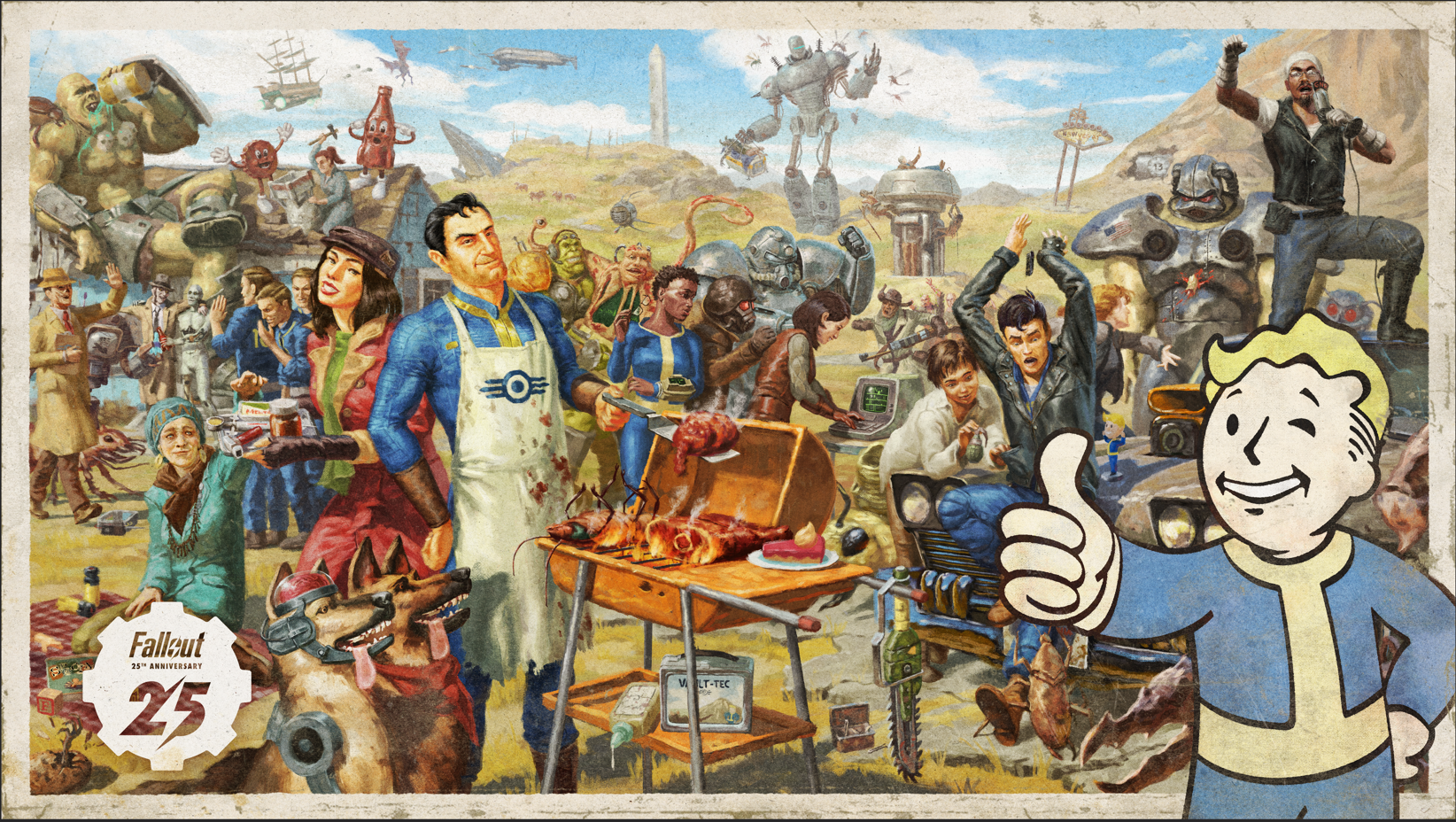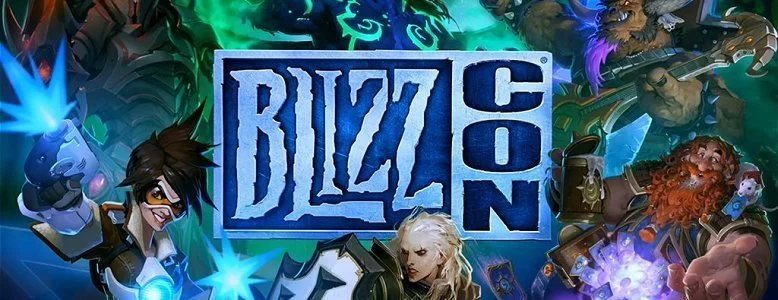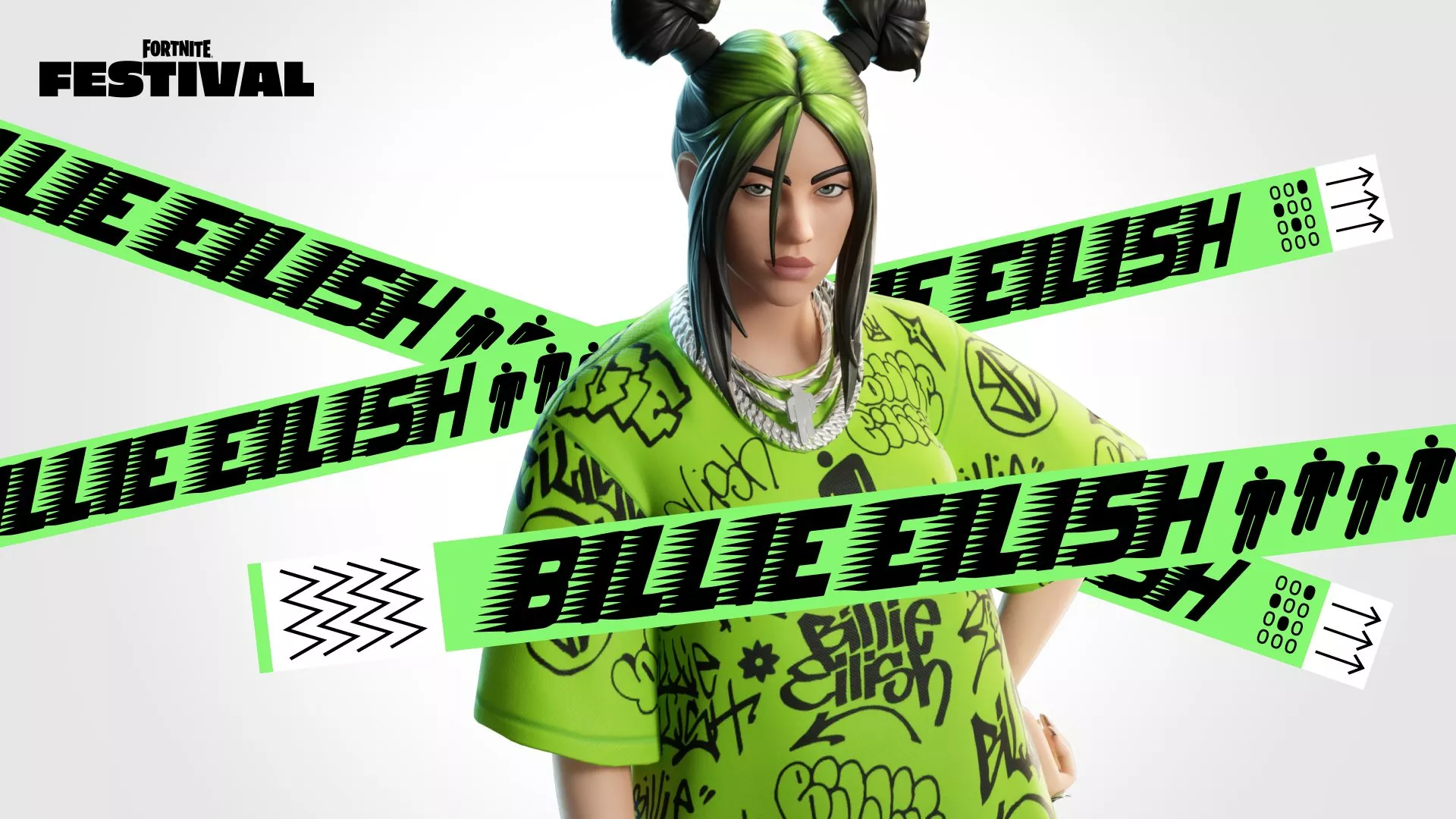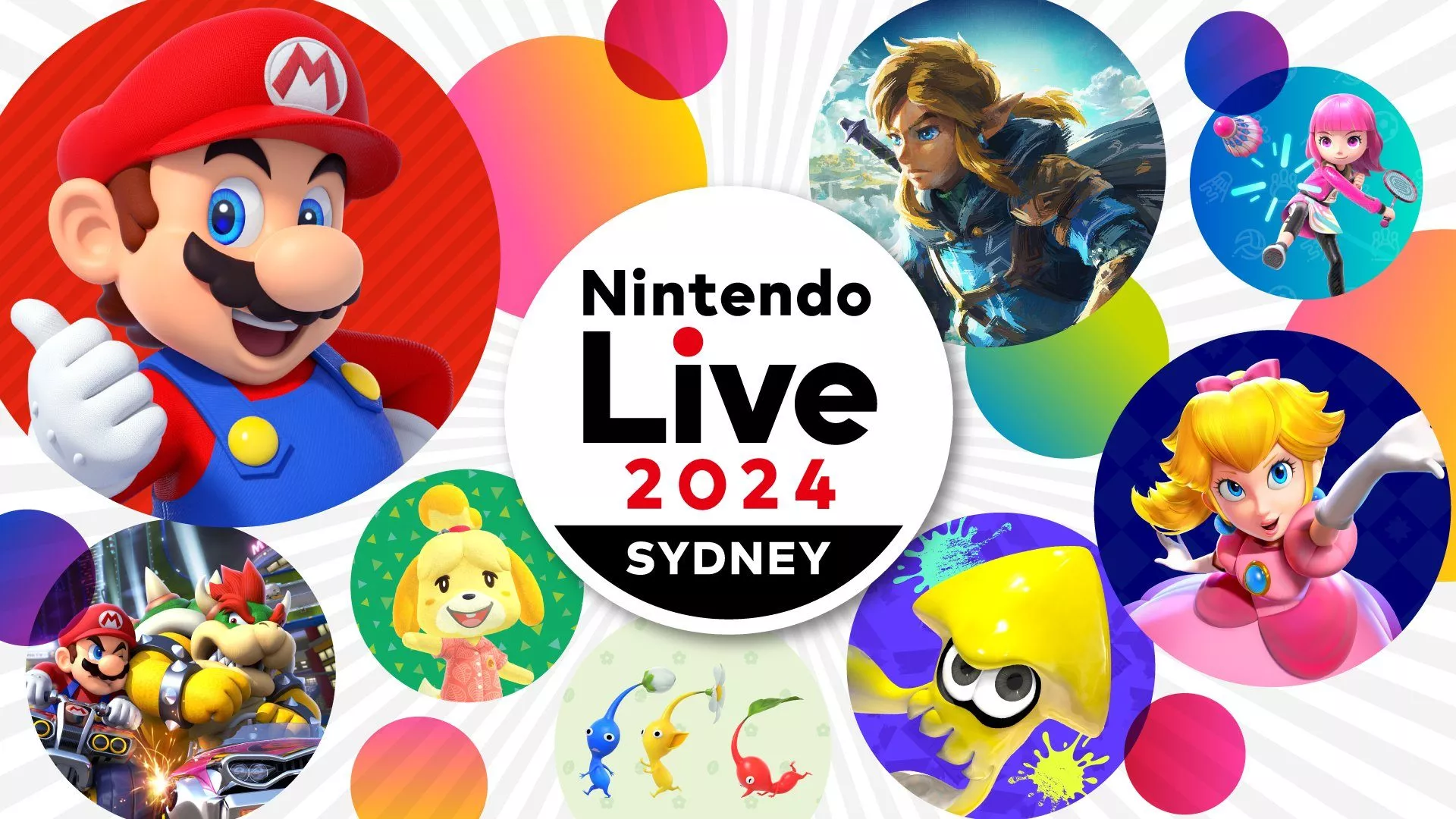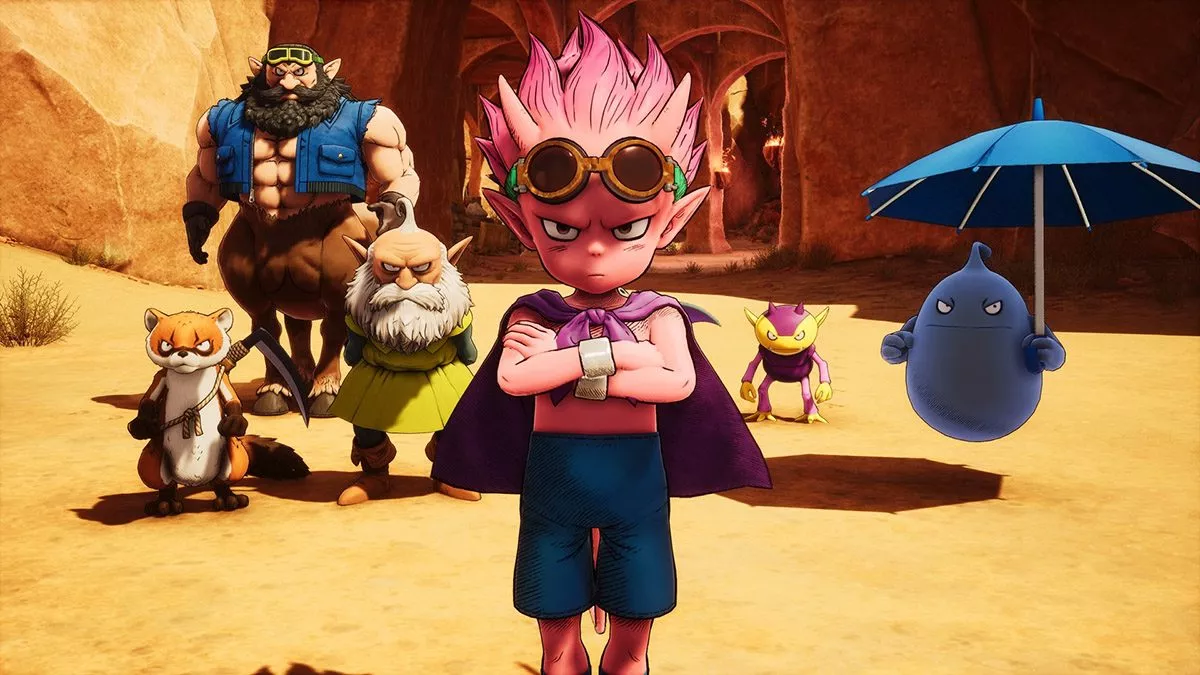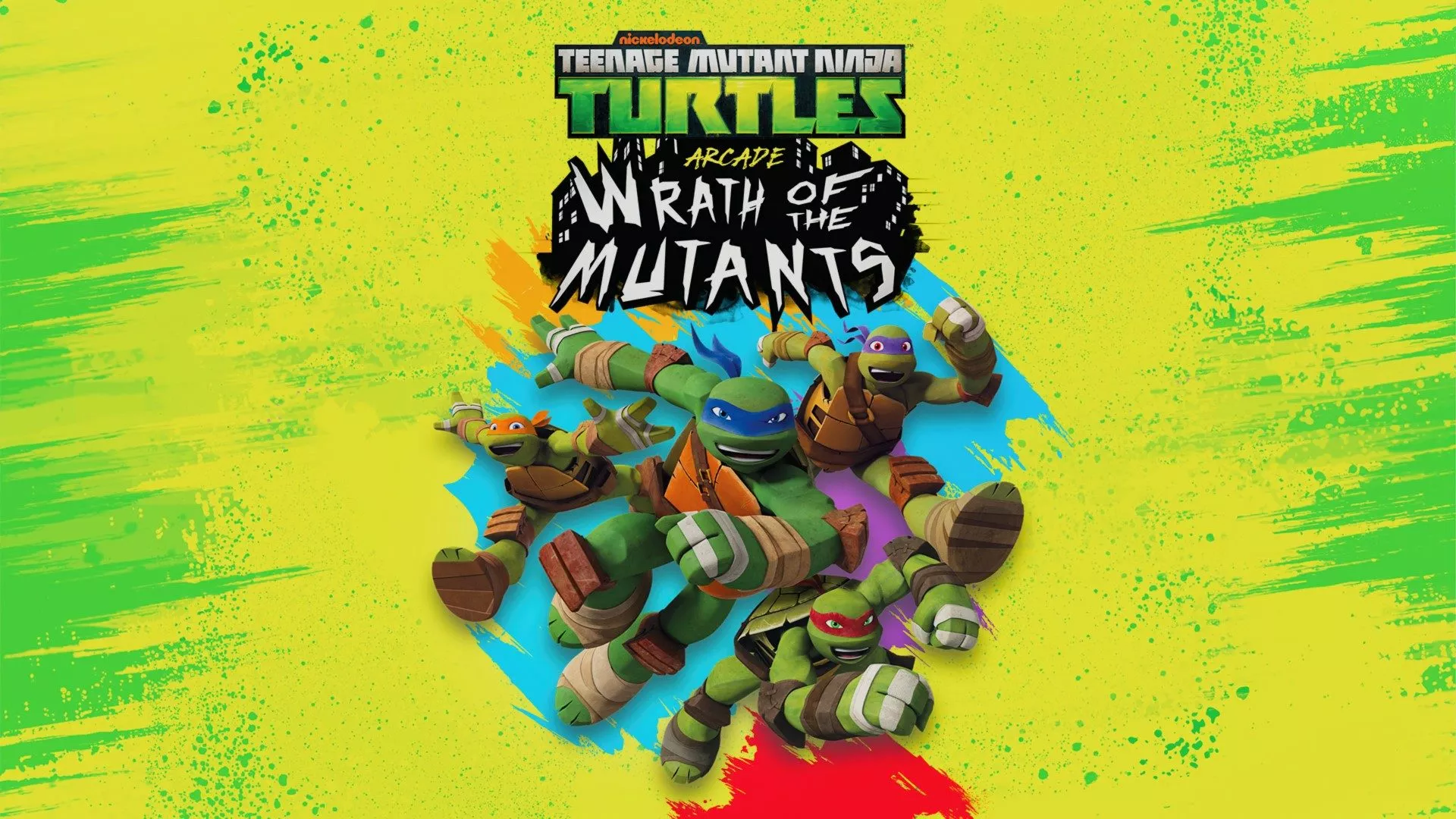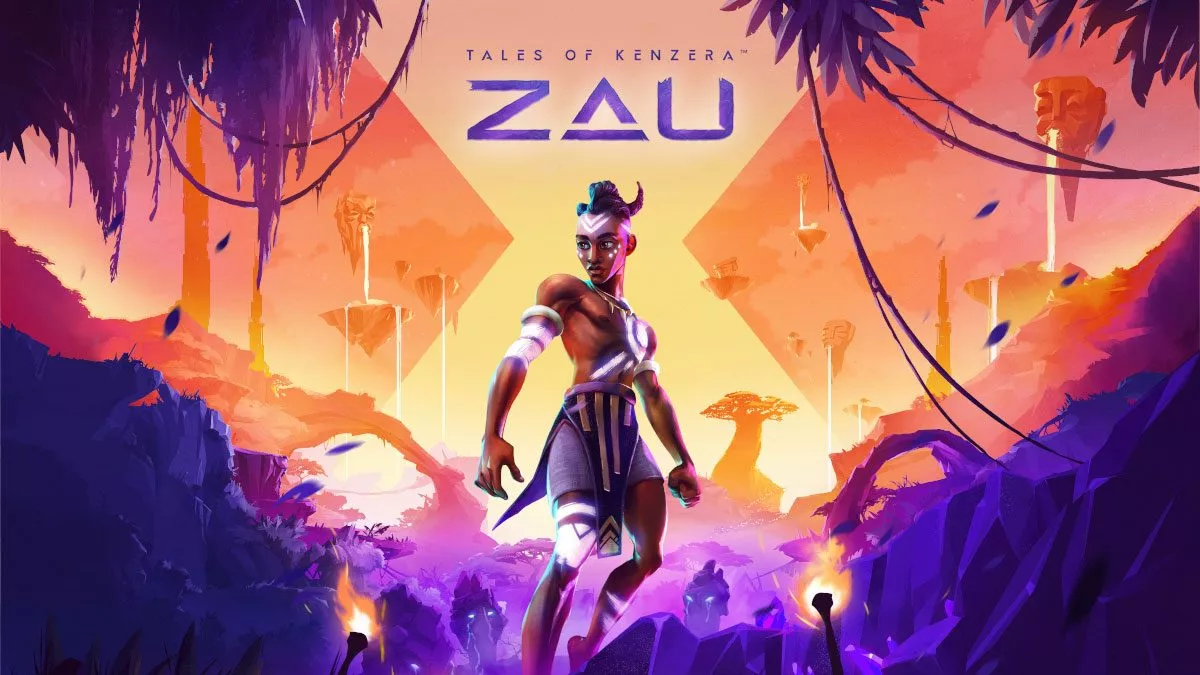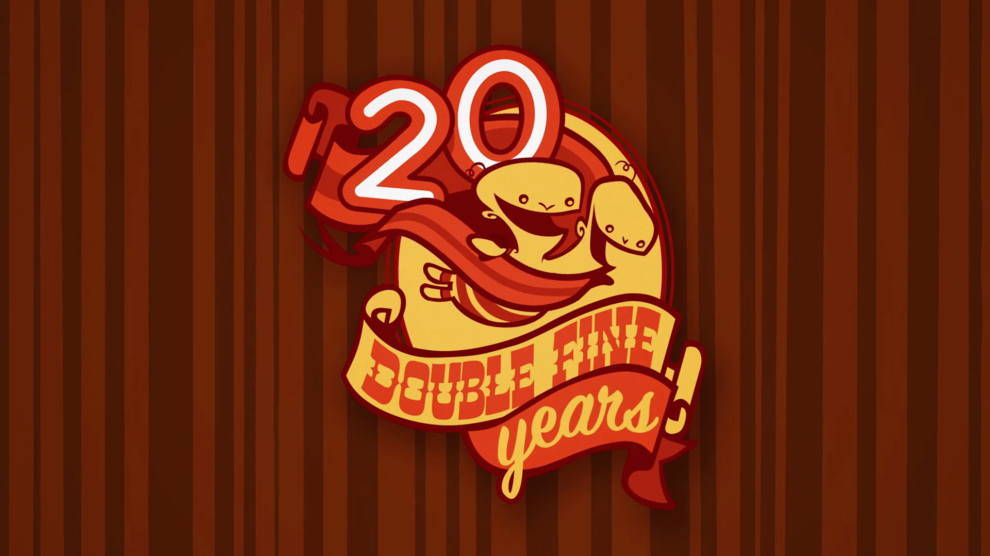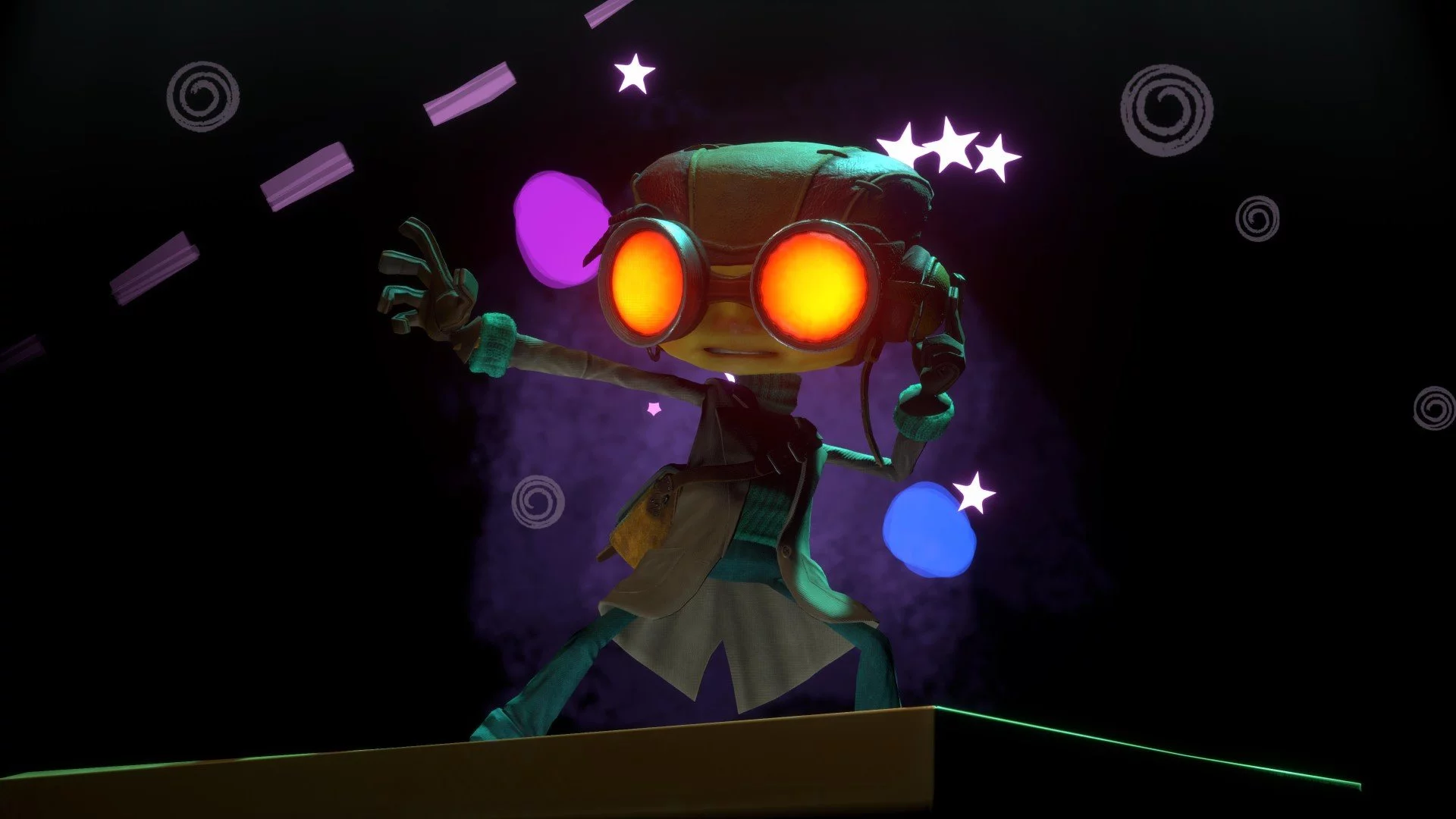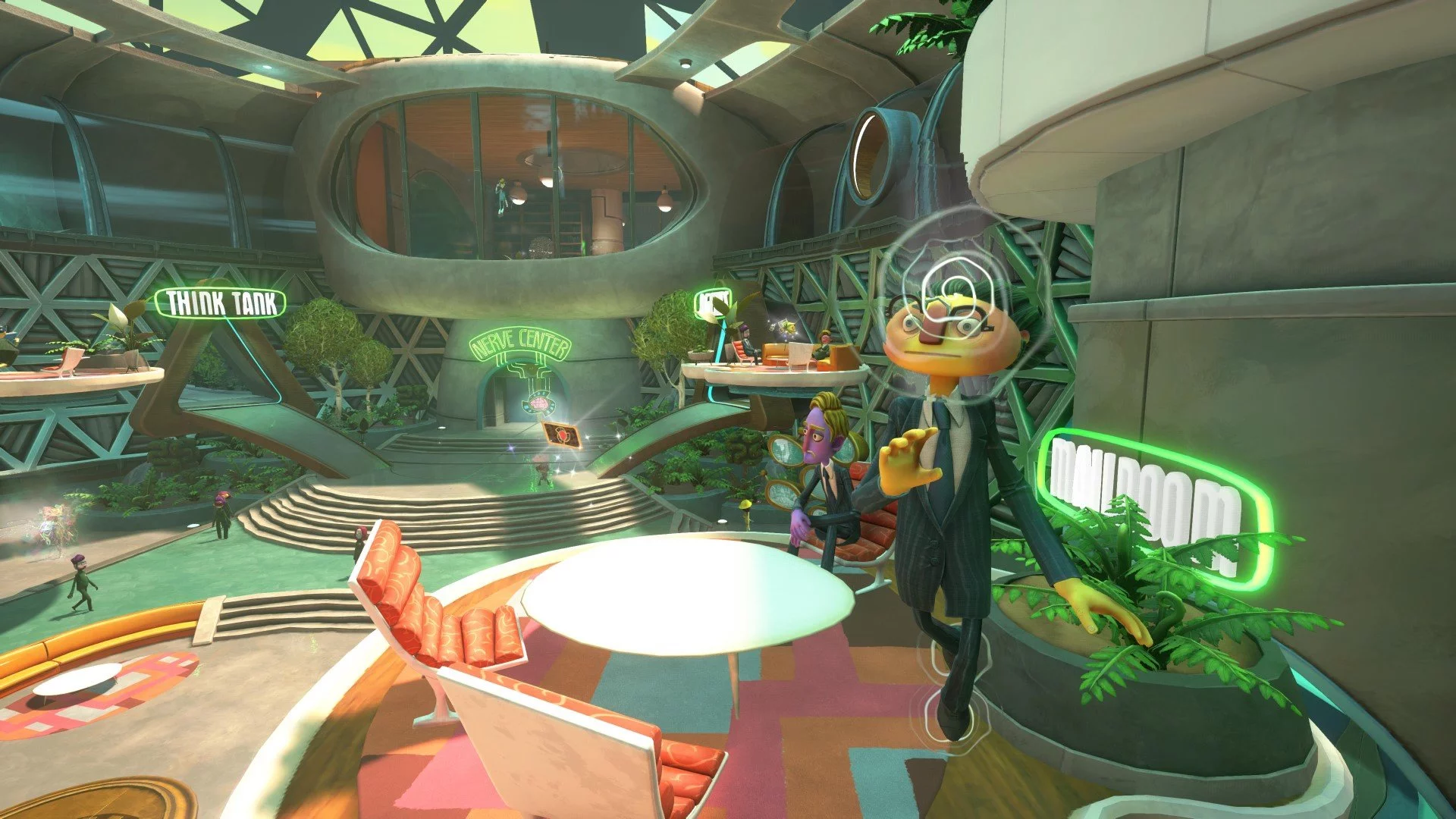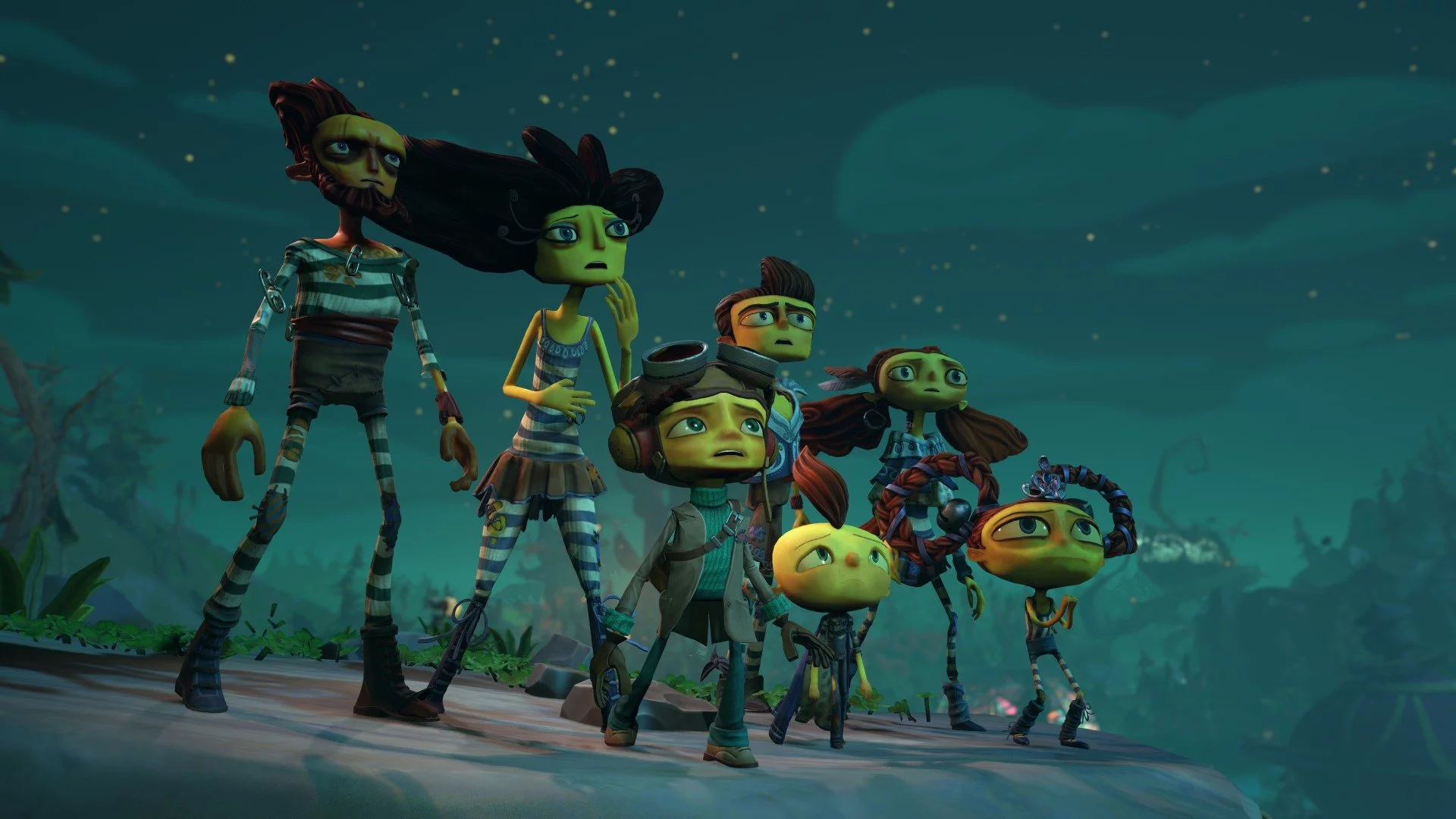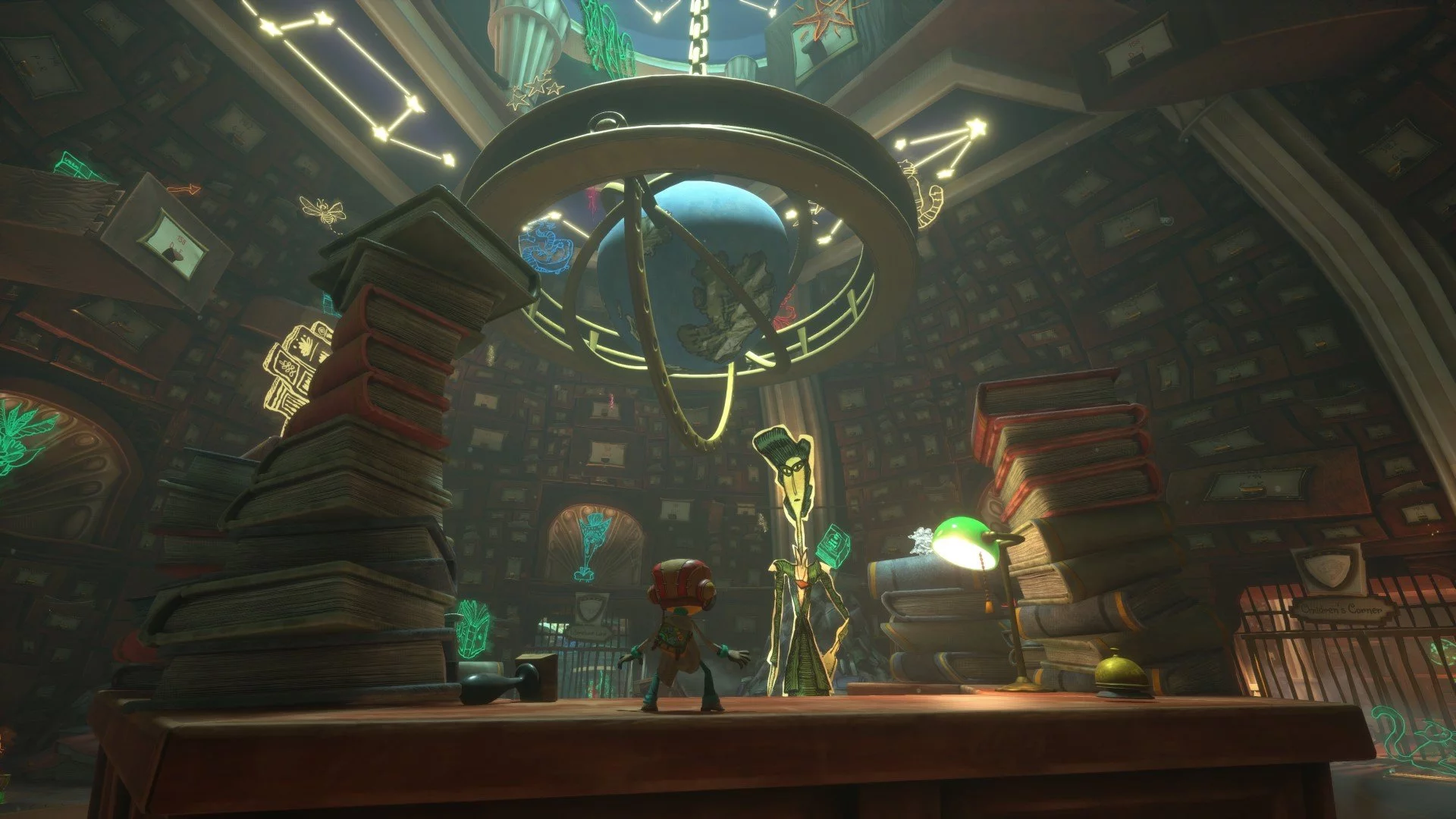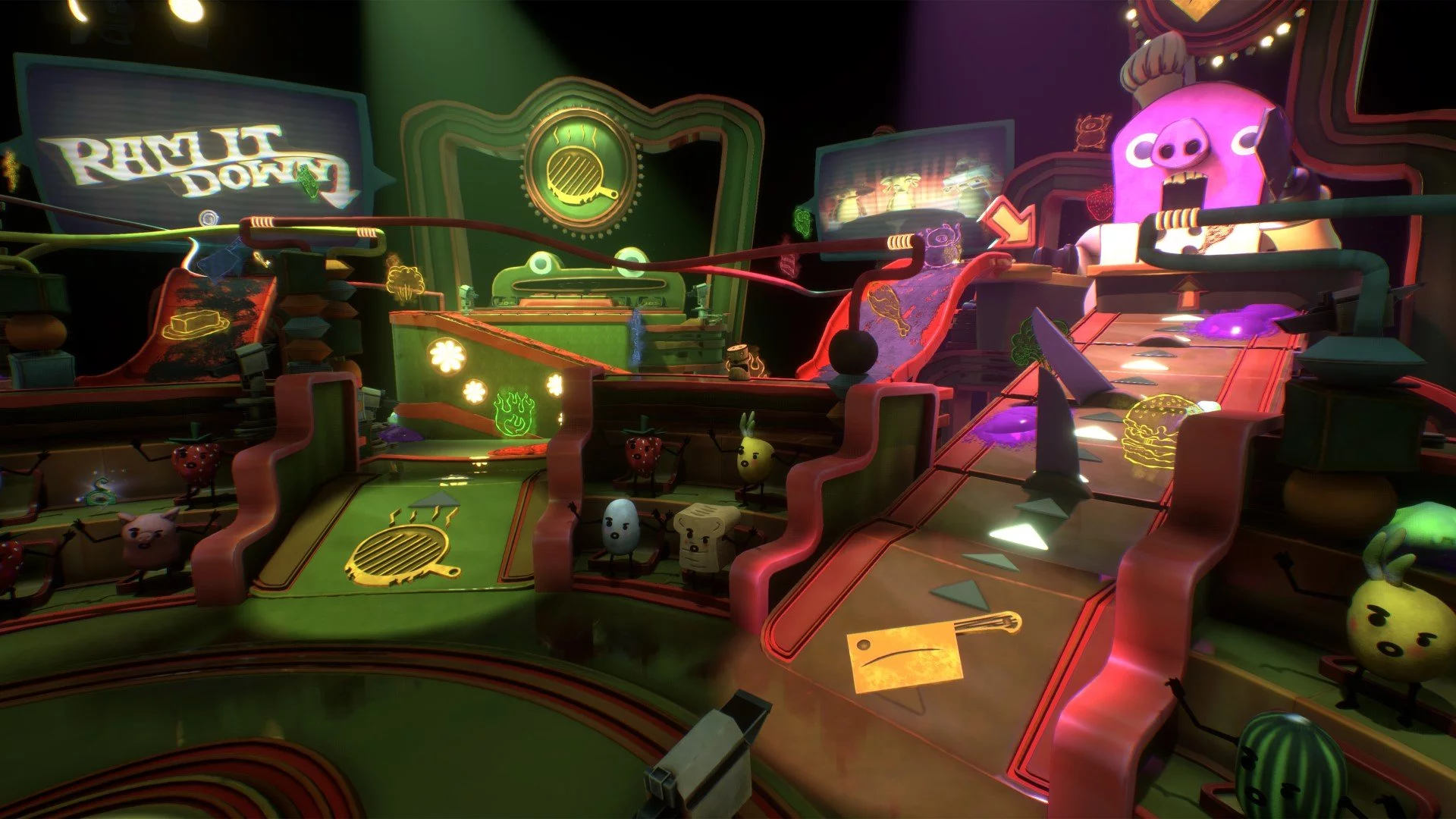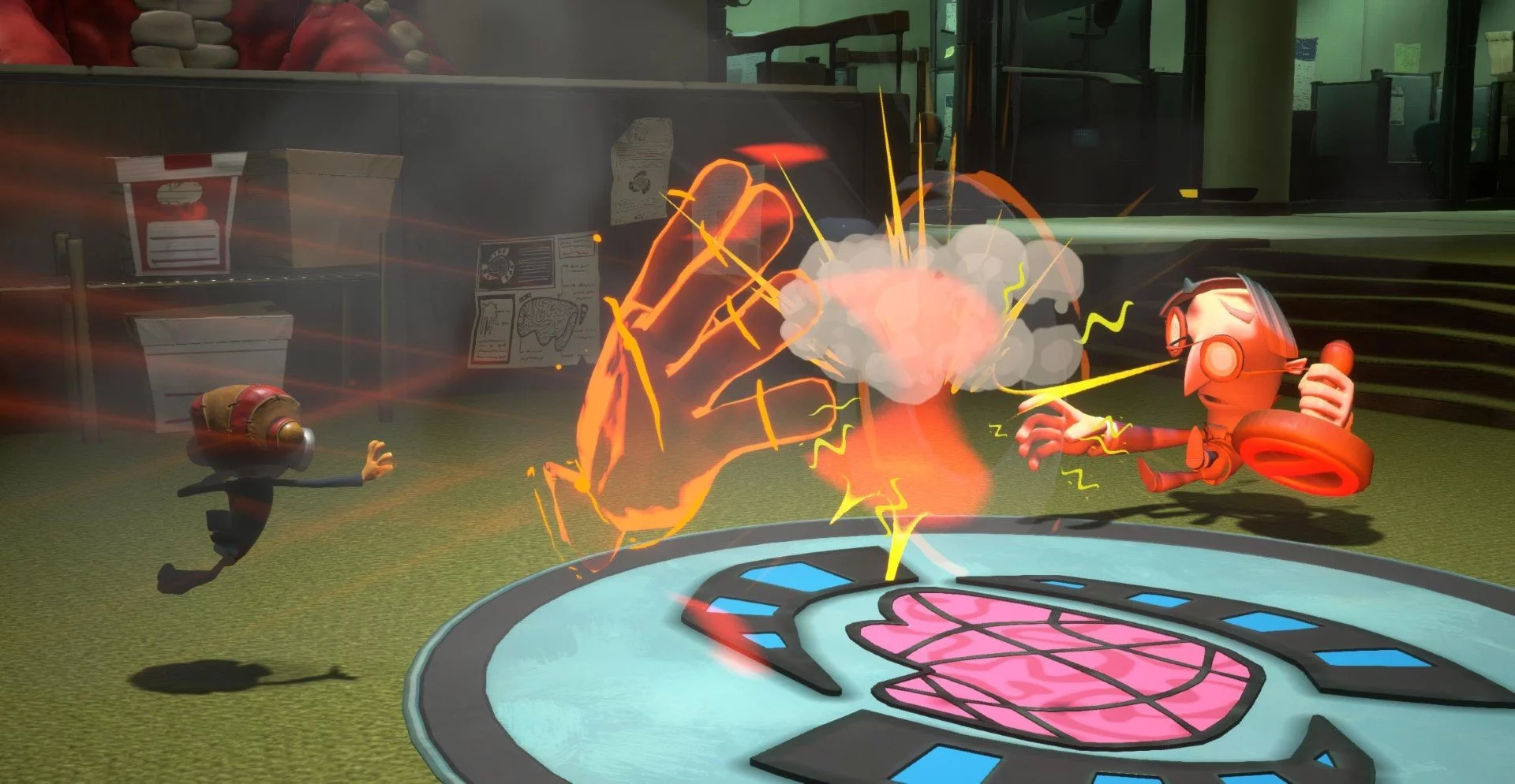We had such an amazing conversation, and you get to listen in!
Psychonauts 2 is right around the corner, and Stevivor was given a once in a lifetime opportunity to speak with industry legend Tim Schafer alongside Senior Systems Designer Lauren Scott about the project, 20 years of Double Fine, accessibility, Achievements and much, much more.
You can listen to the full interview as part of a special Friendly Fire Show podcast episode, or simply refer to the handy transcript that follows below.
Listen to the Friendly Fire Show here.
Steve Wright, Stevivor: First off, congratulations to 20 years of Double Fine – either 20 years of Double Fine proper, or working at a company that has 20 years of history behind it. How are you enjoying this moment?
Tim Schafer, Double Fine: Well, I mean, anyone who’s been in the indie studio knows it’s like a rollercoaster, and so just surviving is a huge thing. Like just, you know, ’cause we made some tough choices along the line to be not just surviving but intact with what we think is our culture — our special culture — intact and still making fun creative games and always doing it like, Frank Sinatra, Double Fine does it their way.
But, you know, [we’re] still really proud of our games. We don’t feel like we’ve had to compromise anything like that to stick around. But we’re very fortunate and we had a great team — a series of teams – over the years that have led to that success.
Stevivor: Lauren, is there a bit of comfort or safety going into a company that has such a long history instead of a startup or like a new indie studio that you know may or may not be here in a year or two?
Lauren Scott, Double Fine: I mean, it’s pretty cool. It’s pretty nice. The two places I’ve worked before this were established, as well. But it’s sort of a different feel when you have you know, people that literally worked on the first game like so many years ago and have been here since the studio’s inception and are still like really excited about being here.
It’s a different feeling than a studio that’s been around forever, but maybe churn through a lot of people.
Stevivor: Tim this is more to you: how important was it to get the old gang back together, or was it equally important to find some sort of new blood balance for Psychonauts 2?
Schafer: We both want to appeal to new gamers and also really, it’s very important with a game like Psychonauts — with a very devoted following — to be very true to what fans of the first game expect, what they loved about the first game.
There’s a certain trust when you start a game, you can almost tell right away if you feel like you can trust the developer. So we have to earn that right away with Psychonauts, and the part of that is so important is it starts with the first initial concept art; being able to get our original concept artist[s] back, Scott Campbell and Peter Chan. And the music will set the mood right away that feels very familiar, from Peter McConnell. And… some of the same programmers and the same modelers obviously lend a lot to it feeling like, “ah. This is the Psychonauts world,” and the actors — getting Richard Horvitz back — and all the actors.
And then, to bring in new fans, what can we do to make things better and what can we expand upon? And that’s where we have new people like Lauren who are working on the design and bringing new ideas for combat and exploration and economy.
Stevivor: Now it’s still kind of insane to me that if we think about Psychonauts 2 six or seven years ago, this kind of got off the ground because of Fig. Now flash forward to today, and if Psychonauts 2 wasn’t a thing I’m sure you could maybe walk up to Phil [Spencer] now and just be like, “I want to make Psychonauts.”
How has being a Microsoft Studio changed Double Fine? What are the positives, or what’s maybe harder as a result of losing indie status.
Schafer: Well, I mean, nothing is really harder. We were very careful ’cause it wasn’t our goal to get acquired; we’re very fiercely independent.
But the way that Xbox has been acquiring studios is what they call “limited integration”. I was asking, it seems like dumb questions, but they were important. Like, “do we have to change our email accounts to be at Tim at Microsoft or not?” – not that I would ever get that – or “do we have to put a logo in our lobby, like a big Windows logo?”
And they were like, “no. No, you keep everything about your company, you still run it the way you ran it all these years. But we provide the money instead of you going out and beating the bushes to find it.”
You know that that’s there and checking that big thing off your list is like, “[now] what do I do with 50% of my mental time now?” and then the answer is, think about the game. Think about creative things instead of thinking about how you’re gonna run out of money in three months.
Stevivor: So that all the boring admin stuff is now out the window. Well, maybe with someone else at least which is that sounds like a very lovely thing.
Schafer: Yeah, you mean all the terrifying financial matters.
Stevivor: The beauty of Psychonauts is that it doesn’t need to be cutting edge. But are there Microsoft technologies like the Azure cloud that you could, or have, tapped into to help in any way?
Schafer: Well, they asked us what we would do if we weren’t constrained by things like finances and stuff, and one of those like, well, we just finish the game properly with the right amount of polish and also take the time to add back in things that we had to cut, like our boss fights and things like that.
And then also, our tech was pretty set, using Unreal [Engine]. So we had access to a sort of knowledge base where we can have our programmers meet programmers from other studios and talk about how they’re using the engine. We can have all our disciplines meet and be part of the combined knowledge of all these different studios. Even though we’re independent, it’s nice to get together with different disciplines and talk [with] someone who does your job at another company.
And then we also have resources that we didn’t have before, like getting Microsoft for all the rigorous and thorough playtesting they can do. Not just for bugs, but for usability, diversity, inclusion, mental health and all the different things that they – accessibility — they can test, and give us notes and make us help us make changes that make the game more accessible to more people.
Stevivor: Completely hypothetical now that you’re in the Microsoft fold, and this isn’t confirmation of anything coming out–
Schafer: Yes, we’re making the next Halo game.
Stevivor: Ah, perfect!
Schafer: Yeah, sorry, I probably shouldn’t confirm that now. And the release date is the day after Psychonauts 2. It’s going to be hard, but we’ve been keeping that in our back pocket for a long time.
Stevivor: Getting in before Infinite. I like it.
Schafer: Sorry. What was your question?
Stevivor: If you could — if you wanted to — take an IP from Microsoft and make a game, what would it be? Would you try a Halo, or bring back Conker, or put Microsoft Excel in the spotlight and give it the game it’s always deserved?
Schafer: Well, we thought about having [Microsoft Word’s] Clippy in the game.
I think what Microsoft and Xbox wanted when they were looking at us is like, “well, this studio can create worlds, and create characters, and create IP.”
So we’re just going to keep doing that. They weren’t looking for a port house to, you know, convert or do DLC for Halo. That’s why I made that joke — at the announcement where we announced that were acquired — I made a joke about how we were going to work on Excel and stuff, but it’s the opposite. They want us for what we were already doing. They knew what we’re doing. They knew the games that we released, and they’re like “yeah, come and do that for Xbox.”
Stevivor: And what Matt Booty said just recently is that they’re not expecting you to have to make Psychonauts 3 next, if you don’t want to. I guess there’s probably the option if you wanted to do that, but it seems like you have a bit of freedom to decide–
Schafer: You gotta send me that link, I need to get that link so it can be legally binding. I didn’t see that.
Stevivor: It’s in The Guardian from, I think, two days ago — and I’m paraphrasing, of course — “if they want to make Psychonauts 3 they can, but we’re not going to force them to”–
Schafer: It’s true. They’ve lived up to what they promised, which is that we run our own ship. They vetted us before – they were like, “we like the games you’re making and… they would be a great addition to Game Pass” and we see how we fit into Game Pass really well.
We get to do — if anything — just more creative, more Double Fine games because we don’t have to think, “well, could we get a publisher to sign this before our money runs out?” which is what we usually would think about.
Stevivor: Lauren, I noticed that you kind of started off, in part at least, as a bit of a game journalist – I was just curious about that.
Scott: You unearthed my distant past.
I did, like very, very briefly for a really small outlet that I think is gone now — just a little bit — ’cause I used to write a lot, and not just like journalistic, but fiction stuff. Anyway, it was never a thing.
Schafer: I like how you said for a site that’s probably gone now, not even worth Googling, not even worth looking up…
Stevivor: Is the same kind of creativity? Writing, and doing what you’re doing now? Or is it a different subset of the brain?
Scott: I mean, journalism? There are for sure places where you can be creative. Games have their constraints, but I feel like this space is just a lot more unbounded; there’s a lot less explored space in games, I think, which is like the intriguing part for me. I always wanted to do something where there were a lot of unknowns and a lot of new ground to tread.
Schafer: One thing I would say that I notice in common for Lauren, I’ve noticed you have very analytical approach. As a designer, when you’re playing games, you can’t help but break them down into how they work.
I’ve noticed you doing that and that’s something where the same skill applies to a game designer and a journalist, which is to be able to look at a game analytically.
I mean, I know what I like — I don’t know what game design is good or not, but I know like when I play it — but then, if you’re going to work professionally as a designer, you have to actually be able to say stuff out loud about why something might work, which is hard. It’s really hard to look at like why is this jump is fun, but this jump isn’t fun? But you know, professional designers can be like, “well, let me tell you, let me show you a graph.”
Stevivor: Now, usually if Microsoft has time to introduce me to someone I’m interviewing, my gamerscore comes up and because no one did it, I’m just going to tell you my gamerscore because I’m very proud of it. It’s like 560,000 or something along that line.
Schafer: (Mocking) Something, something like that. But thank you for asking! Oh, no one did ask? Okay.
Stevivor: So obviously, Achievements are very important to me. Lauren and I were kind of talking about the fact you’re on the hunt for collectibles Tim, so I’m assuming there’s probably Achievements tied to that.
How much influence do both of you have into the Achievement list and how do they come about? I’m always kind of curious as to who decides what the milestones are and how many gamerscore gets allocated to each thing and all those kind of things.
Schafer: I don’t know that too Lauren.
Scott: I think we started out just soliciting ideas from the team because we just wanted to see — you know, ’cause no one person like knows every single part of the game — so there might be someone on a different team that knows, “oh, there’s this thing that you can do in combat, and it’s like this really cool trick, and if you do it, then you should be able to get like a secret Achievement or something.”
So, first we sent out a spreadsheet [to] fill out some funny stuff and then we filled it out with more standard game milestones, like beating certain levels and hitting certain ranks and stuff. So it’s a balance of team input and then sensible achievements.
Schafer: As an Achievement hunter yourself, if you were just playing game normally and you finished it without trying to get any special Achievements, what percentage of the Achievements do you think you should have? That’s the debate designers will have.
Stevivor: Like, half, maybe? Lauren — too much, not enough?
Scott: I don’t know. I usually end up with, like, a third. Or maybe half.
Schafer: I always say, like, 70[%]?
Stevivor: Well, more is always good. I’m fine with more — it’s, like, if you have an Achievement in your game that’s like, “spend 700 hours doing something” I’m going to be upset with you, especially if it’s worth 10 or actually, even if it’s worth 100 gamerscore. I’m going to be annoyed at that.
Schafer: Yeah, I think that’s why I’ve never fully 100%ed Brutal Legend because you have to get 50 ranked victories, and just everyone got too good, too fast. I couldn’t. I could do friendly matches, but I could never get ranked.
I play every year, on the anniversary, so maybe eventually after 50 years I’ll do it, I’m sure. After 50 years I’ll do it.
Stevivor: I’m sure if you took to Twitter or something people would probably — it’s known as boosting — probably help you. You of all people.
Schafer: Throw games? I don’t know about this lingo man. I don’t know. You’ve gotta tell me about the dirty world of bootleg Achievements.
Stevivor: TrueAchievements.com. That’s not my website, I’m just giving it to them now.
I’m sorry — back on track with Psychonauts. How do you guys both feel about the original Psychonauts on Xbox One or Xbox Series and seeing how crazy it looks now? Does it mean a remake or remaster doesn’t have to happen?
Schafer: It’s great to play the original. You can play the original on Game Pass right now and you never know, someday — now that we have more resources — we could remaster that someday. But it would be a lot of work because a lot of that was not archived properly. A lot of the scenes would have to be remade from scratch, and so, maybe someday.
I think the original game really holds up in a lot of ways, especially the stuff that was rendered in-engine ’cause a lot of its style comes from the shape language of the characters and stuff, and that still is kind of evergreen.
Stevivor: It’s just the camera. You have to kind of train yourself not to use modern day camera thumbs for older games. I went back to play Psychonauts to kind of do a comparison after I played 2 and it was like, “oh no, no — right thumb down!”
Schafer: Yeah, definitely. Our new camera programmer, Aaron Jacobs, has been masterfully writing really, really elegant — so you don’t even notice the things that it’s doing sometimes — he just does these crazy things.
So that’s definitely one of the areas — along with combat – the two things we wanted to make better: combat and camera.
Stevivor: And obviously playing 2, there are there are references to the Rhombus of Ruin, and I’ve never played it – it’s a VR stint. Is there anything from the VR title that of continues on? Learnings or things like that, that maybe I haven’t noticed, or wouldn’t know to notice?
Schafer: There’s a lot. I mean, we were already designing Psychonauts 2 while Rhombus was in production. So we’re like, “let’s stick this thing in Rhombus and we’re going to call back.”
So there are a lot of callbacks to it, but if you didn’t play Rhombus, you wouldn’t know you’re missing it. There are a lot of jokes about Harold the Rat or the crab sandwich that you’d think are funnier if you played Rhombus of Ruin.
Stevivor: I know there’s a big opening that kind of tries to catch you up — and it’s literally events that occurred, you know, days or hours before Psychonauts 2 — but how did Double Fine approach trying to catch people up in case they didn’t want to play the older games?
Schafer: Like how did we make that animated little sequence or?
Stevivor: Yeah, like was it like an all-hands kind of, “what are the important plot points,” or, you’ve said you had 2 in your brain since the original Psychonauts, so did you just lay out what was important and needed to be retold?
Schafer: I wrote the script and then the amazing Michael Fuhrman did the art and animation – it’s just an incredible looking thing.
But I wrote it because I kind of knew where the bodies were buried. I knew the little things that I stuck in the first game, like the stumps around the campfire and all these things that paid off in the second game and so I feel like I had to call up all the stuff that you might not understand if you hadn’t played it. Like the fact that Ford can teleport.
I wanted to make sure that we at least touched on everything — it’s kind of like when you watch the “previously on the TV show” and they show a scene like, “oh, I bet that character is coming back ’cause they showed him the previously on.”
Stevivor: This has been in your head for a long time, but has anything changed because it’s now 2021? As an example, I assume that the concept of “Ram It Down” [a level in Psychonauts 2 styled after a reality cooking show] might not have been where it was back in the day as it is now. You know, like with you know reality shows and Masterchef and whatever is in the world–
Schafer: That’s true. Was Iron Chef around? I think we knew about Iron Chef.
The funny story about “Ram It Down” is that that whole level was taken from a game concept that Asif Siddiky, one of our Project Leaders in Amnesia Fortnight, which is our game jam — Lauren was also one of those Project Leaders.
He did this game and it was really cool and it was sitting around and were were like, “hey, that would make a great level for a game. Can we just take that?” And Josef said, “ok, but only if I have to do all the work and fix all the bugs.”
Stevivor: Lauren, can you talk more about Amnesia Fortnight?
Scott: Well, Amnesia Fortnight is a crazy amazing experience. Everyone in the studio has a chance to pitch their game – like, anybody in any role — Asif was actually a documentarian and came from behind the camera to pitch a game idea.
Then, the team votes – and Tim votes too — in the top few games, and the top few games get to be worked on for two weeks and then we have prototypes and we try ‘em out and it’s really fun.
Schafer: And that’s where ideas for Costume Quest and Stacking and Iron Brigade, Once Upon a Monster and Middle Manager of Justice all came from.
Scott: And “Ram It Down”.
Schafer: And “Ram It Down”.
Stevivor: Can we speak about the theme — it’s a giant theme — of mental health? Why it’s important to cover and if that’s changed in the last year and a half because of new mental health challenges that I think we’re all facing as a result of the pandemic?
Schafer: We are talking about mental health a lot more now and I think it’s become a lot less stigmatised and I think that’s been a really positive change.
Games is really easy shorthand to make a “crazy villain”. It’s a fast way to make someone like, “it’s ok to shoot this person because they’re far gone; they’re this other thing.”
I think, hopefully, people realise that that’s really damaging to think about people who are going through mental situations as some sort of other thing. They’re really just like us; we all have brains, we all have periods where go through something like that. Or someone we love is doing that.
And so, the game itself has always tried to demonstrate — the first time on accident, but this one more intentionally — that you meet someone and they’re doing something negative, like trying to take over the world like Coach Oleander. But then you go inside their head and you see the world through their eyes, and you realise they’re suffering in their own way, and that you, in this case, can actually help them with that.
So Raz really never leaves any brain worse off for him visiting; he always leaves them in a better place. That’s why someone, who is one of our actors, [was] reading for a line and said, “the thing I like about this game is that every level is about healing.”
It never occurred to me that we we’re doing that. It just intuitively felt like if you’re going to go inside someone’s mind, you can’t help but learn something and be a little more empathetic at the end.
Stevivor: That idea of empathy — there’s the kind of counterbalance of “don’t meet your heroes” — Raz has always wanted to be a Psychonaut and then he gets to meet the crew and he’s kind of realising that they need his help more than he needs theirs.
Schafer: That’s definitely true. He thinks they’re going to be this perfect organisation, and he finds out they’re run by flawed people and they actually are suffering from a lot of funding problems, and they also have a spy working inside the organization — a counterspy. Which is good because if they didn’t need his help, there wouldn’t be much of a game. They actually need a lot of help from Raz.
Scott: But he’s still able to see through those flaws too and see the awesome parts of them as well. Light and dark.
Stevivor: Double Fine is doubling down on accessibility — you had a big swipe at “get good”culture. How did that come about? How did we get to this point where, like, we’re not just going to kind of skirt around the issue, we’re just going to like point at you and say “you are the problem here. Let people play how they want to play.”
Schafer: A lot of it actually took us by surprise. It didn’t occur to me to be a contentious or controversial opinion. We’ve always wanted as many people as possible to enjoy our games, and narrative-based games like way back in terms of Secret of Monkey Island 2, we put in difficulty modes because we heard a lot of people who are like, I really like the story in these games, but I can’t handle these puzzles, I want the flow to go more easy.” And we’re like, “well, who are we to tell people how to enjoy the content that we made.”
I actually feel like I learned a lot of that from our speed runners, like watching people on Awesome Games Done Quick. We made a video of watching a speed runner play Psychonauts 1, and the beginning of the video, you can see how horrified we are that he’s skipping all our content by speed running past it, but by the end of the video were all cheering him because we’re like,”oh my God, he’s found a different way to interact with our game that he loves, that we didn’t plan,” and you’re so lucky if someone does that — puts in the work to find a new way to enjoy the theme.
To bring that back, it’s not up to you — when you make something, a creative work of art, it’s not up to you to tell people how to look at it; how to enjoy it.
Scott: Yeah, and I’m just glad that it broadens the pool of people that can play the game, because for some people it’s either this key accessibility feature or not playing the game. And we would obviously rather them play it, and enjoy it.
Schafer: Honestly, you can make it hard as you want. You can turn your brightness way down so you can barely see it. You can do anything. Play with the TV off.
Stevivor: Are there any achievements, tied to difficulty? If you use all the accessibility options and make it as “easy as possible” are you limiting yourself from anything in that list?
Schafer: I don’t think so. Lauren? I can’t say definitively ’cause Lauren’s kept a list of achievements secret from me, but…
Scott: No. There’s couple of like combat-related ones that you have to do things — like sort of combo-like things — that maybe if you turn on certain ones like the narrative mode that makes you do more damage, you might kill things too fast to do to get an Achievement or two…
Schafer: Not on purpose. We haven’t purposely tried to be, like, “well, you’re cheating so you don’t get this Achievement!”
Stevivor: There’s not a “finish the entire game on hard with your left hand tied behind your back”. And it sounds like you can probably bump the combat back up to, you know, get your ten-hit combo or what have you and then put it back down.
Scott: Or, we have like the narrative mode which makes you do more damage and invincibility mode which makes you take less damage. So if you need to do a ton of combos, you can just swap accessibility features so that you can get your combos in but you’re not being damaged, and it’s sort of like the same thing.
Schafer: That would be hacking the game. Hacking the game.
Stevivor: It’s not hacking if it’s okay!
Schafer: We haven’t purposely purposely prohibited it; also, I feel like we’re we’re more interested in everyone being able to enjoy the content we made rather than making sure everyone can get every single Achievement.
Achievements are like an extra thing — although they have such lovely, beautiful art for them, maybe it should be seen as the mainline content.
Stevivor: Is there anything else either of you wanted to say before PR shuffles us off?
Scott: There’s a lot of new stuff in this game. A lot of new upgrades, a lot of new items, a lot of new enemies, new powers, new new new. But then lots of stuff coming back that you’ll know and love if you played the first game.
Schafer: Well said, well said. That’s true.
Stevivor: And not long to go. Congratulations to you both on your upcoming release–
Schafer: Yeah, we’ve got to get it done, so we can work on that Halo.
Stevivor: Yeah! You don’t have much time — you said a day after Psychonauts 2?
Scott: We can do it.
Schafer: I mean, late — like end of day. Later in the day.
Scott: And no crunch, obviously.
Schafer: Basically, it’s a reskin of Psychonauts 2. It’s just, we put a helmet on them.
Our thanks to Tim and Lauren for their time.
Psychonauts 2 heads to Windows PC, Mac, Linux, Xbox One, Xbox Series S, Xbox Series X, PS4 and PS5 on 25 August 2021, part of the Xbox Game Pass program.
This article may contain affiliate links, meaning we could earn a small commission if you click-through and make a purchase. Stevivor is an independent outlet and our journalism is in no way influenced by any advertiser or commercial initiative.


